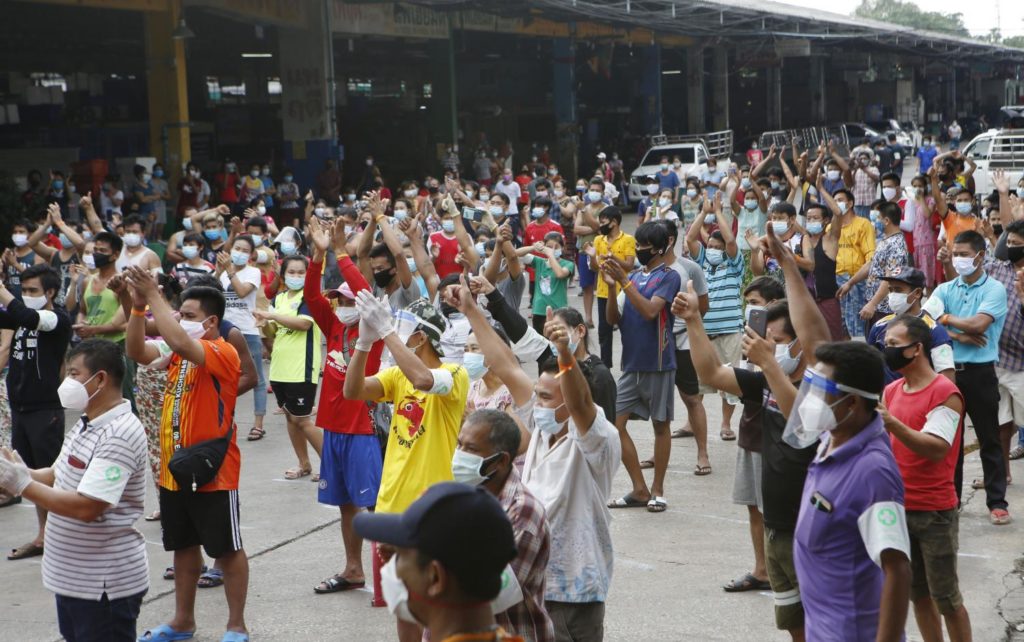On March 4, the Ministry of Labour planned to discuss with the Social Security Board about offering free Covid?19 vaccines to migrant workers who were insured under the social security programme. Migrant workers are vital to Thai industries and the economy; therefore, they should not be left out of the vaccination programme, said the labour minister.
Now, three-and-a-half months later, neither has a formal announcement been made as to the status of migrant workers who will be included in the vaccination programme, nor is there a system in place for the registration of migrant workers to receive Covid-19 vaccines.

It is widely understood that herd immunity through vaccination is the preferred pathway to economic recovery, and that level of immunity requires that a significant portion of the population in the country is vaccinated properly. In Thailand, considering that migrant workers, according to the official figures, account for almost 3.5% of the population, they must therefore be included in the vaccination programme regardless of their status.
Last year, when the outbreak happened among thousands of migrant workers in Samut Sakhon province, many people in society were surprised to learn that Thailand hosted such a high number of migrant workers. This shows that migrant workers are somehow invisible to many Thais, despite the fact that they contribute to the national economy enormously.According to the Bank of Thailand, the Thai labour market has, for the past 20 years, been increasingly dependent on migrant workers, particularly manual labourers. In 2019, the number of low-skilled migrant workers insured under Section 33 of the social security programme was 1,025,293, accounting for 8.7% of total insured persons.
Considering that many migrant workers are not covered under the social security scheme, e.g. those who are excluded by the social security law such as domestic workers, and those with identification issues, the actual number of migrant workers in Thailand is thought to be much higher. They are vital parts of various economic sectors which are the main engines of the national economy such as manufacturing, agriculture and fisheries, and services like construction and restaurants.
Yet, migrant workers have not received much assistance from the government during the current pandemic. Being invisible means they are prone to being left out from Covid-19 relief packages. Pandemic or not, migrant workers tend to be the first to be dismissed from employment, or have wages and work hours reduced. Their living conditions, especially those assigned to dwell in crowded dormitories and communities, expose them to a high risk of infection. With little support, mostly from civil society organisations (CSOs), migrant workers are struggling to fend off this infectious disease. If they continue to be excluded from the vaccination plan, it is only a matter of time before they spark a new outbreak.
We learned from the experiences of many countries that shortcomings in coronavirus containment measures can lead to new virus variants which are often more infectious. The series of outbreaks in Thailand, with some involving migrant workers, suggests that it is time to properly address the health and safety of migrant workers during this pandemic. Hence, we propose the following measures.
First, the government should quickly include migrant workers in the free vaccination programme, perhaps starting with insured persons under the social security scheme. After all, these migrant workers have contributed to the social security fund.
Registration for vaccination should be easy for migrant workers to enrol. Registration via applications or websites alone may result in a number of migrant workers being left out due to limited ICT literacy, language barriers, and the lack of availability of internet service and smart phones. Additional outreach plans such as through CSOs should be considered.
Secondly, an amnesty policy for migrant workers with document issues who would like to get vaccinated should be introduced. Due to the pandemic and external factors such as the political unrest in Myanmar, a large number of migrant workers are not able to leave Thailand and are holding invalid permits. If they are not protected from prosecution under the immigration law, these group of migrants may not come forward for vaccination. Considering that on June 8, the Thai cabinet just approved an amnesty for migrant workers to be screened for Covid-19, get health insurance packages, and resolve permits issues, then extending the amnesty to vaccination should not be too difficult.
Third, migrant workers should be compensated for the adverse effects of vaccines in order to encourage vaccination. The National Health Security Office (NHSO) guidelines for compensating Covid-19 vaccine recipients who experience adverse effects sets criteria and steps for the compensation claims specifying that only Thai recipients of Covid-19 vaccines provided by the government are eligible to submit claims. From the lens of a public health agenda, as it is reported that a large number of migrant workers are concerned about the adverse effects of Covid-19 vaccines and may refuse to take the shots, so a policy to include migrant workers in a fund, which may be established to provide compensation for such adverse effect from the vaccines, would be very welcome.
The Covid-19 pandemic has been with us for a year and a half now, and during all this time migrant workers have been neglected. To reboot the economy, we need to quickly reach herd immunity. In order to do so, we cannot exclude migrant workers from the vaccination programme. In this pandemic, nobody is safe until everybody is safe.
By Boonwara Sumano, PhD, is a senior research fellow at the Thailand Development Research Institute (TDRI) and N Aneksomboonphon is an independent contributor. Policy analyses from TDRI appear in the Bangkok Post on alternate Wednesdays.
Frist Published: Bangkok Post on June 23, 2021
More in TDRI insight
- Sustainability ratings just a gimmick?
- Farm Aggregation and role of the private sector in Thailand: toward sustainable and equitable and equitable food systems
- Overcrowded prisons need reforming
- Making exports for a low-carbon era
- “กัญชาไทย…จะไปทางไหน?” ทีดีอาร์ไอ เปิดผลประเมินทางสุขภาพ-เศรษฐกิจ-สังคม หลังปลดล็อกกัญชา 2 ปี พร้อมข้อเสนอแนะเชิงนโยบาย
